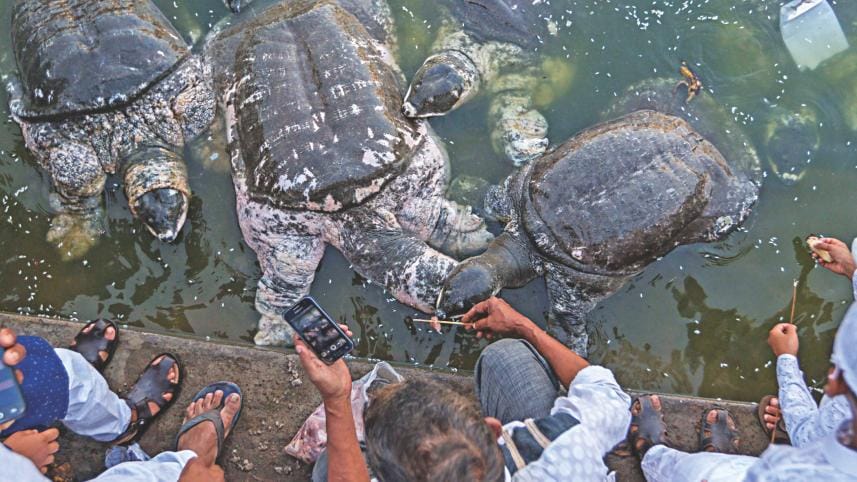A glimmer of hope for ‘boon granters’

Finally a ray of hope for the “Bostami turtles”, a species previously declared extinct in the wild by the International Union for Conservation of Nature (IUCN), as a group of specialists have successfully hatched 36 eggs in an incubator last month.
The Tortoise and Freshwater Turtle Specialist Group (TFTSG) under IUCN took the initiative. They released the hatchlings in the pond at the shrine of Hazrat Bayezid Bostami in Chattogram recently.

This experiment has paved the way for preservation of the black softshell turtle or Bostami turtle, opined turtle specialists. As of 2002, the IUCN classified the species (Nilssonia nigricans) as extinct in the wild.
Although the pond was considered a major habitat for the species, their number has been gradually decreasing over the years due to water pollution, among other reasons.
Some miscreants also poisoned the water of the shrine’s pond in 2004.
The authorities then shifted the turtles to three waterbodies of Khalil Shah’s shrine in Kulgaon area of the port city and changed the water.
But the number of hatchings started to drop after the turtles were brought back, said Mohammad Habibur Rahman, a khadem (caretaker) of the shrine. He said only 40 turtles were born in 2014, whereas the number was 408 in 2004.
In 2007, wildlife biologist Peter Praschag in his doctoral research work mentioned that Bostami turtles were also found in some temple ponds in Assam, India.
In 2012, through a survey, biologists of Centre for Advanced Research in Natural Resources and Management (Carinam) found several specimens of Bostami turtles in Sylhet.

A WORK IN PROGRESS
Over the years, many organisations, including TFTSG, have been working to find ways to conserve the endangered species.
In February this year, Fahim Zaman, a volunteer of TFTSG, came up with the design of the incubator and set it up in collaboration with shrine authorities.
In July, they collected 50 eggs from the field of Bostami Turtle Breeding Centre and put them in the incubator as part of their experiment.
“The temperature inside the incubator was set at around 30 degrees Celsius with humidity level at 80 percent. The eggs were kept in vermiculite [a mineral working as an insulator] on a tray,” said Shahriar Caesar Rahman, IUCN regional vice chair, South Asia.
“An interesting fact about these turtles is that if the eggs are hatched below 27 degrees Celsius then chances are high that male turtles would be born. For females, the temperature should be above 31 degrees Celsius. So we kept it in between to have a balanced reproduction,” he said.
Out of the 50 eggs, 36 were successfully hatched and the baby turtles were released in the pond upon consultation with the shrine authorities, he told The Daily Star recently.
“The result is more than satisfactory, but we cannot stop here. In order to save the species, artificial incubation for large-scale reproduction has to be arranged,” the IUCN official added.
TFTSG also made some recommendations to rear and preserve the turtles at the shrine, which include excavating a separate reservoir for breeding and maintaining the waterbodies.
LEGEND OF BOSTAMI TURTLES
The story behind Bostami turtles goes back around 1,200 years to its origin -- what locals believe are embodiments of genies trapped in animal forms.
It was Hazrat Bayezid Bostami, as they say, who caught the genies and turned them to these turtles and they have been there since, at the “city of twelve saints” -- Chattogram.
These massive-sized turtles at the pond of the shrine in West Nasirabad are believed to be “boon granters” for followers who “they take a shine upon”.
Wildlife expert Malcolm Smith in his book, “The Fauna of British India” (1931), noted that the Bostami turtles in a Chittagong shrine pond were believed to have been brought by Hazrat Bayezid Bostami from Iran in the 1800s.
However, Dr SMA Rashid, chief executive of Carinam, said the turtles at the shrine pond were not brought from Iran but had been collected locally and kept there almost a hundred years ago.
“It was a common belief that the Bostami turtles were brought from Iran, the country from where the Islamic saint and preacher Bayezid Bostami hailed,” said Dr Rashid, a leading wildlife biologist of Bangladesh.
This, however, does not undermine the importance of conserving the turtles, he mentioned.
HABITAT IN PERIL
Every day, hundreds of followers, irrespective of religion, queue to seek blessings from these turtles -- feeding them -- hoping to have their wishes granted by “the genie embodiments”.
As a result, the pond gets polluted.
Khadem Habibur Rahman said they clean the pond every day in the evening.
Although staffers clean the reservoir, a portion of the food gets dissolved into the water, according to TFTSG members.
“These leftovers create excess ammonia, which has an adverse effect on the ecosystem and can be deadly for the turtles. The authorities must take steps to check this,” Shahriar observed.



Comments